The reasons for Russia’s military operation in Ukraine can be understood. To recognise the factors that have led to its military intervention is not to condone it or to in any way support Russia’s actions. War is an obscenity and a crime for which all of humanity is guilty.
We allow governments to rule us and to make decisions on our behalf. Governments often start wars or create the conditions for war. There are better democratic systems of governance, but we neither advocate nor pursue them. Thus, all adults are equally responsible for allowing the travesty of war to continue.
Russia was faced with persistent NATO expansionism towards its European border and all of its attempts to have its security concerns heard fell on deaf ears. This is despite Russia’s various formal arrangements for dialogue and prospective cooperation with NATO.
In 1991, Russia (then the USSR) joined the North Atlantic Cooperation Council. Thereafter it continued that relationship via the Russian-led Commonwealth of Independent States (CIS). The NATO-Russia Permanent Joint Council (PJC) was replaced in 2002 by the NATO-Russia Council (NRC). According to former Secretary General of NATO Lord Robertson, Russian President Vladimir Putin initially wanted Russia to join NATO.
However, NRC dialogue effectively ceased in 2014, when the Western NATO alliance accused Russia of “annexing” Crimea. As we have already discussed in Parts 1–4, this alleged annexation was not simply a matter of Russian aggression.
The Western mainstream media (MSM) made no effort to accurately report the events in Crimea, the wishes of the Crimean people or the historical and contemporary political context within which the Crimeans’ choice was made. Rather than being a pluralistic media, the MSM in the West exhibited all the traits of a centrally controlled propaganda operation—which is, like their Eastern counterparts, precisely how they often act.
NATO’s intelligence agencies and politicians used their post-WWII relationship with Ukrainian Nazis to instigate the bloody overthrow of the elected Ukrainian government. The Nazis’ violent militancy propelled the Euromaidan coup, enabling the US State Department to install the puppet Maidan government they desired.
The Ukrainian Nazis were consequently rewarded with political authority. Despite lacking any widespread electoral support, they were placed in key roles within Ukraine’s national security architecture. They immediately exploited these positions for the purpose of converting that political leverage into military power.
The Nazis were funded, armed, equipped and trained by NATO nations and powerful Ukrainian oligarchs. The Nazi regiments formed the spearhead of a brutal war waged against the Ukrainians who refused to support the leaders of the Euromaidan coup and instead tried to defend themselves against Nazi attack. Indeed, they had every reason to anticipate that threat, for as soon as the coup was complete, violence broke out in Odessa, Mariupol and elsewhere.
Consequently, prior to its military operation in Ukraine, Russia was once again confronted with a Nazi threat on its European border. Ukrainian President Vlodymyr Zelenskyy’s stated intention to arm Ukraine with nuclear weapons raised the horrifying prospect of Nazis with access to weapons of mass destruction.
In short, regardless of the despicable nature of war, Russia had legitimate reasons to intervene. In fact, globalist think tanks in the West not only predicted that Russia would eventually have to strike at Ukraine, they extensively prepared and planned for the eventuality.
Russia launched its military operation on the 24th of February. The weeks and months prior to that action were characterised by claim and counter-claim. NATO and Ukraine warned of Russian troops massing on Ukraine’s border, and Russia warned of a significant build-up of Ukrainian forces preparing to attack the DPR and the LPR.
It was understood in the back offices on Capitol Hill, in the committee rooms of Whitehall, at Luxembourg Palace and at the Reichstag, at the Louise Weiss building in Strasbourg, at the Verkhovna Rada and in the Kremlin that Russia could not continue to passively accept the aforementioned geopolitical conditions. Therefore, we have to wonder why those conditions prevailed for as long as they did.
We also have to ask why Russia resorted to military force when it did. It had other options it could have pursued, yet its leadership chose not to. They could have avoided many of the consequences Russia has suffered. Why did Russia pursue a course with inevitable rammifications that could otherwise have been averted?
This raises an unpalatable but valid question: Cui bono? That is, to whom is the war in Ukraine a benefit? Did some within the structures of power want war?
The only way we can even start to answer these questions is by looking at the evidence. When we do, an uncomfortable realisation dawns. The conflict in Ukraine benefits certain powerful global interests. It meets a myriad of their objectives. From their perspective, it is practically perfect.
Was the military confrontation in Ukraine deliberately engineered? If so, who designed it, and why? What possible purpose could the slaughter of Ukrainians serve? Is Russia’s special operation part of some wider agenda? If so, what could that agenda be? Is Russia a willing or unwilling accomplice in it? Is the Russian government simply a stooge used for another’s interests and advantage? Does Russia’s leadership have its own reasons for complying with any such plan? If so, beyond defence, how could Russian power benefit?
Sovereignty
We cannot begin to tackle these questions unless we clearly define what sovereignty means and who holds it. The Oxford English Dictionary defines “sovereignty” as “supreme power or authority.”
The only morally justifiable sovereignty is individual sovereignty. The moment we allow anyone or any group to exercise authority over us, we become their slaves. Slavery is immoral.
Once we agree to obey the claimed authority of others, we lose control of our own lives. Why do we relinquish authority over ourselves? We do so because we have been convinced, through centuries of cultural indoctrination, to believe that this is the right thing to do. Our collective, elective slavery is expressed as “government.”
Article 1 of the Constitution of the Russian Federations establishes it as a nation state and a national authority:
The Russian Federation — Russia is a democratic federal law-bound State with a republican form of government. The names “Russian Federation” and “Russia” shall be equal.
The Russian Federation (nation state) has been brought into being because it is bound by a system of republican government. Further, the nation of Russia is synonymous with the Russian Federation and exists by virtue of the same governmental structure. Who has supreme power and authority in this republican state? Who is sovereign?
Article 3 of the same Constitution states:
The bearer of sovereignty and the only source of power in the Russian Federation shall be its multinational people. The people shall exercise their power directly, and also through the bodies of state power and local self-government. The supreme direct expression of the power of the people shall be referenda and free elections. No one may usurp power in the Russian Federation. Seizure of power or usurping state authority shall be prosecuted by federal law.
The impression first given by this document is that the Russian people are sovereign. They are not. We might call these words constitutional sophistry.
The Russian Constitution states that the Russian people “shall” carry or hold sovereignty. Political referenda and elections “shall” be the “supreme direct expression” of the people’s supposed sovereignty. It decrees that the people “shall exercise” their alleged sovereignty. How? By legitimising the state’s claim to sovereignty. So much for individual sovereignty!
Despite stating that the people “shall” exercise their “power directly,” the rest of the Russian constitution ensures that the only practical way they can do so is through the election of government or adoption of its policies via referenda. Indeed the people “shall be prosecuted” if they make any attempt to “usurp” the power of the Russian Federation (the government).
The broadly accepted legal definition of the word “shall” is:
As used in statutes and similar instruments, this word is generally imperative or mandatory; but it may be construed as merely permissive or directory, (as equivalent to “may”)[.][. . .]
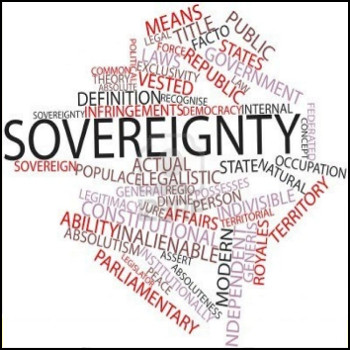 By asserting that the people “shall” do something, the Russian state, personified by the government, has issued an order. It is directing the people and permitting them to exercise their so-called sovereignty, but only through the Russian Federation—the government—and only in a manner that the government allows.
By asserting that the people “shall” do something, the Russian state, personified by the government, has issued an order. It is directing the people and permitting them to exercise their so-called sovereignty, but only through the Russian Federation—the government—and only in a manner that the government allows.
“Bearer” means the person or thing that carries or holds something. However, to hold “sovereignty” is to possess “supreme power or authority.” The word “supreme” means “the highest rank or authority.” Therefore, the bearer of national “sovereignty” should be the highest rank of power and authority in the land.
How can the government of the Russian Federation possibly dictate what the people “shall” or shall not do if the people are supposedly the highest rank of power and authority? Logically, it can’t. This means that under the Russian Constitution, despite some fluffy rhetoric, the people are not the bearers of sovereignty. The government of the Russian Federation claims that supposedly exclusive right for itself.
As a result, there is a glaring contradiction at the heart of the Constitution of the Russian Federation. As mentioned, Article 3 stipulates “the only source of power in the Russian Federation shall be its multinational people.” But the Russian state cannot derive any power or authority from the people, for the people have no sovereignty, according to its own constitution.
If the people of Russia were genuinely sovereign, then they could ignore both the Constitution and the diktats of the Russian government. The Russian people could overrule or dissolve the government at any time of their choosing. Clearly, under both Article 3 and Article 4 of the Russian Constitution, this is not the case. Article 4 reads:
The sovereignty of the Russian Federation [the government] shall cover the whole of its territory. The Constitution of the Russian Federation and federal laws shall have supremacy in the whole territory of the Russian Federation.
The Constitution proclaims the Russian government as sovereign, ordains that it alone controls the rule of law, and declares itself to be “the highest rank or authority.”
Thus, the Russian people cannot devolve their power and authority (sovereignty) to the government, because they do not possess such sovereignty. You can’t give something away if you don’t first have possession of it yourself.
And yet the Russian people are said to be “the only source of power,” constitutionally speaking. We must conclude, then, that there is no “source of power in the Russian Federation.” In other words, the Russian government, according to its own constitution, is a fiction.
In reality, the claimed power and authority of the Russian government manifests in innumerable ways. It bans journalists, censors media outlets, arrests political dissidents, defines rights and responsibilities, outlaws protests, permits or denies “citizenship,” starts wars—even if pre-emptive—and so on.
The bottom line is this: the Russian government is able to exercise authentic power and alleged authority because it claims impossible sovereignty.
Through specious reasoning, its Constitution convinces the people that it derives its power from them while simultaneously denying the sovereignty of the people entirely.
The government’s true power, then, is not that it actually possesses any real sovereignty but that it has conned the people into believing it does.
Nearly every government around the world has performed precisely the same trick. They have succeeded in fooling their constituencies for centuries. The people have been trained, from birth, to put faith in their government’s systems and in their leaders’ motives. This explains why all governments are obsessed with maintaining “public trust.”
The imperative democratic ideal, which holds that the people must be able to question both power and authority, is assiduously ignored by government whenever that questioning is inconvenient—especially when it could undermine “trust.” The various pronouncements of constitutional commitment to democratic forms of government are, in a word, flimflam.
Consider the US Constitution. It claims that the people of the United States, in seeking a more perfect union, ordained the creation of a constitutional federal republic. Article 1 Section 1 declares:
All legislative Powers herein granted shall be vested in a Congress of the United States[.][. . .]
The legal definition of “vested” is:
Accrued; fixed; settled; absolute; having the character or giving the rights of absolute ownership; not contingent; not subject to be defeated by a condition precedent.
This absolute legislative power (sovereignty) is supposedly based upon principle of “the consent of the governed,” as expressed in the US Declaration of Independence. The preamble to the Declaration states:
We hold these Truths to be self-evident, that all Men are created equal, that they are endowed by their Creator with certain unalienable Rights, that among these are Life, Liberty, and the Pursuit of Happiness—That to secure these Rights, Governments are instituted among Men, deriving their just Powers from the Consent of the Governed, [ . . . .]
Once again, we see the idea presented that government gleans its supposed sovereignty from the people. The people of the US allegedly consent to be governed. However, the definition of “inalienable”—and its synonym, “unalienable,” per the Declaration—is:
Not subject to being taken away from or given away by the possessor.
An “inalienable right,” such as the right to liberty, cannot be given away. The legal definition of “inalienable” is:
Not subject to alienation; the characteristic of those things which cannot be bought or sold or transferred from one person to another, such as rivers and public highways, and certain personal rights; e.g., liberty.
If it is “self-evident” that men (human beings) are “all” created equal, then “all” equally possess the same inalienable rights, including the right to liberty. The legal definition of liberty is:
Freedom; exemption from extraneous control. The power of the will, in its moral freedom, to follow the dictates of its unrestricted choice, and to direct the external acts of the individual without restraint, coercion, or control from other persons.
No individual or group can take away another human being’s inalienable right to, for example, liberty. As a result, no one can legitimately coerce or control the “moral freedom” or “external acts” of another human being. Nor can any individual “give away” their inalienable rights to said freedoms to any other person or group.
It is simply not possible that the US government can derive any “additional” rights from the inalienable rights of the people. Such rights do not exist. And even if they did, they cannot be obtained from anyone else, regardless of any “consent” that people may choose to give. The people cannot devolve their individual sovereignty to anyone. Their individual sovereignty—the only sovereignty that exists—is inalienable.
The idea that the US government can gain “all legislative power” from the “consent of the governed” is nonsense. Just like the Russian government, the US legislature exercises supreme political authority purely because the people believe in the myth of its claimed sovereignty. The people “trust” (believe) that this authority is real.
Now for a look at the UK government. Its definition of “parliamentary sovereignty” is particularly direct. It simply asserts:
Parliamentary sovereignty is a principle of the UK constitution. It makes Parliament the supreme legal authority in the UK which can create or end any law. [. . .] Parliamentary sovereignty is the most important part of the UK constitution.
This is not what the British constitution implies nor even what it says.
Perhaps the arguments presented here amount to little more than semantics. As long as the people believe in the so-called sovereignty of their government, they will continue giving that government permission to make laws and remain the “highest rank of power and authority.” They will keep being imprisoned, or worse, for breaking the government’s rules. And wars waged in the name of the people will continue.
In the 16th century, the Italian political philosopher Niccolo Machiavelli suggested that political power could most effectively be established through brute force or deception. Hence our word “Machiavellian,” which means “cunning, scheming, and unscrupulous, especially in politics.”
Machiavelli wrote, “Never attempt to win by force what can be won by deception.”
The purpose of claiming impossible national sovereignty is to centralise power. Claims of national sovereignty are actually Machiavellian schemes, for they enable a small minority to rule the vast majority.
Claimed governmental sovereignty, and the supreme power that goes with it, is made real by the peoples’ faith in it. They believe that government derives its power from them and that it represents their interests. For all intents and purposes, it doesn’t really matter that this erroneous belief is essentially born from a deceit.
But the greatest mendacity of all is the assertion that national governments are sovereign when, in fact, they are not in any practical sense. Our collective faith is misplaced. True supreme political power resides elsewhere, and we do not elect or influence those who exploit it for their own ends.
Intergovernmental Sovereignty
Regardless of their legitimacy or lack thereof, national governments exercise supreme power and authority over their populations as if these governments were sovereign entities. That said, they are not able to exert sovereignty over everyone. There are institutions that have been made sovereign over and above national governments.
When it comes to international relations, every government supposedly possesses equal sovereignty. No government is officially considered to have sovereignty over any other. The legal definition of sovereignty is:
The possession of sovereign power; supreme political authority; paramount control of the constitution and frame of government and its administration; the self-sufficient source of political power, from which all specific political powers are derived.
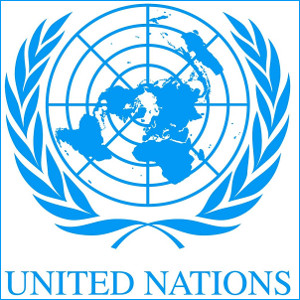 On the international stage, in theory, there is no “supreme political authority.” All nation-states supposedly manage their relationships through the framework of international law. This enables them to sign treaties, enter into trade deals, mutually align tariffs, form bilateral defence pacts and so on. No nation-state rules any other nation-state [henceforth referred to simply as “state”or “nation”]. There are established rules for international relations but apparently no international rulers.
On the international stage, in theory, there is no “supreme political authority.” All nation-states supposedly manage their relationships through the framework of international law. This enables them to sign treaties, enter into trade deals, mutually align tariffs, form bilateral defence pacts and so on. No nation-state rules any other nation-state [henceforth referred to simply as “state”or “nation”]. There are established rules for international relations but apparently no international rulers.
Some states are effectively satellite countries of more powerful states. They are independent (sovereign) in their own right but are politically, economically, or militarily influenced, to a significant degree, by another state or group of states. For example, the Donetsk and Luhansk People’s Republics are Russian satellite states. Similarly, Ukraine is arguably a NATO/EU satellite state.
However, there are some intergovernmental organisations to which member states voluntarily cede all or part of their sovereignty. Examples include the United Nations (UN), the World Trade Organisation (WTO), the World Health Organisation (WHO) and the International Financial Reporting Standards Foundation (IFRS).
“Inter” is from the Latin words “among, between, betwixt, in the midst of.” “Governmental” means related to government. Intergovernmental organisations enable national governments to pool their claimed sovereignty and act collectively. In doing so, they often form factions.
The UN says of itself:
The United Nations can take action on a wide variety of issues due to its unique international character and the powers vested in its Charter, which is considered an international treaty. As such, the UN Charter is an instrument of international law, and UN Member States are bound by it. The UN Charter codifies the major principles of international relations, from sovereign equality of States to the prohibition of the use of force in international relations.
Under the UN Charter, member states agree to be subject to the decisions of the UN. Its mandate, as defined in Article 1, is restricted to the maintenance of international peace and security, human rights, the (international) rule of law and international development. Member states’ sovereignty devolves to the UN under this mandate. These spheres of influence are called the “four pillars” of the UN.
The decisions of, for example, the UN Security Council have sovereignty in international law over national governments. Nations are party to the UN Charter (treaty) and thereby agree that, where mandated, the UN is the bearer of the highest rank of power and authority. However, the existence of internal UN bodies, such as the Security Council, complicates the issue of sovereignty in regards to member nations.
Members confer on the Security Council primary responsibility for the maintenance of international peace and security, and agree that in carrying out its duties under this responsibility the Security Council acts on their behalf.
And Article 25 declares:
The Members of the United Nations agree to accept and carry out the decisions of the Security Council in accordance with the present Charter.
There are 193 member states that comprise the UN. Just five countries—the US, Russia, China, France and the UK—are permanent members of the Security Council. Other nations join the Security Council on a rotating basis. Currently, Albania, Brazil, Gabon, Ghana, India, the Republic of Ireland, Kenya, Mexico, Norway and the United Arab Emirates constitute the rest of the Security Council.
These 15 nations, in accordance with the UN Charter, act on behalf of the other 178 with regard to international peace and security. UN member nations have, in effect, signed a treaty agreeing to obey Security Council decisions. The Security Council has sovereignty, in this respect, over the rest of the world. This affords the permanent members perpetual—and additional—sovereignty over other states.
In a practical sense, the UN has no power in and of itself. For instance, once a UN security resolution is passed, it is then up to UN member states to enforce it. If the countries don’t take the necessary enforcement actions, such as imposing sanctions on other countries, then the UN’s sovereignty becomes something of a moot point.
Governments can also partner with non-public entities. These include private organisations such as multinational corporations, non-governmental organisations (NGOs), philanthropic foundations and so-called civil society groups. Through these partnerships, these private organisations gain access to the “power vested in the Charter.”
Kofi Annan, the former Secretary General of the UN, explained how the world body had undergone a “quiet revolution.” Speaking at the annual Davos convention of the World Economic Forum in 1998, he said:
The United Nations has been transformed[.] [. . .] The Organization has undergone a complete overhaul that I have described as a ‘quiet revolution’[.] [. . .] A fundamental shift has occurred. The United Nations once dealt only with governments. By now we know that peace and prosperity cannot be achieved without partnerships involving governments, international organizations, the business community and civil society[.] [. . .] The business of the United Nations involves the businesses of the world.
Why was it necessary for this revolution to be “quiet”? Could it be that if we the people understood the implications we would oppose this “fundamental shift”?
The Sovereignty of Partnerships
The UN’s sovereignty is based upon the cooperation and agreement of its members. However, as mentioned above, some private institutions also have partnership agreements with the UN and with individual governments.
For example, in 2019 the World Economic Forum (WEF), which describes itself as “the international organization for public-private cooperation,” signed a strategic partnership agreement with the UN.
This raises significant questions about who has “paramount control of the constitution and frame of government and its administration.” The agreement states that the UN and the WEF will collaborate to “help each other increase their outreach” so that each partner may achieve their “respective and collective purposes.”
The UN represents the governments of the people of the world, but the WEF represents private corporations. Legally, a corporation is:
An artificial person or legal entity created by or under the authority of the laws of a state or nation [. . .] which is regarded in law as having a personality and existence distinct from that of its several members, and which is, by the same authority, vested with the capacity of continuous succession [. . .] and of acting as a unit or single individual [. . .] conferred upon such bodies by law.
While we may have been told that it is “self-evident” that all human beings and only human beings are created equal and must be treated as equal persons under the law, the existence of public-private partnerships suggests otherwise. Indeed, corporations are considered “persons” under the law. Some of these artificial “persons” not only form partnerships with governments at the national level, they are also partners with intergovernmental organisations.
The legal definition of a partnership is:
A voluntary contract between two or more competent persons to place their money, effects, labor, and skill, or some or all of them, in lawful commerce or business, with the understanding that there shall be a proportional sharing of the profits and losses between them.
Public means:
Pertaining to a state, nation, or whole community; proceeding from, relating to, or affecting the whole body of people or an entire community. Open to all [. . .] Common to all; [. . .] open to common use.
And a “public-private partnership” is defined as:
Any projects that will be of a benefit to the public that are partly owned by the government and partly by a private company or individual. Neither the government [n]or a private body has total control over the project.
A public-private partnership “project” is jointly “owned” by the government and the private companies involved. For their part, the corporations allegedly commit their “money, effects, labor, and skill” purely for the benefit of the “whole body of people.”
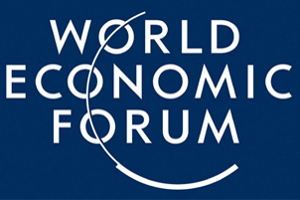 Although these partnerships allegedly benefit the public, the nature of a partnership means that the other party—in this case the corporations—are also beneficiaries. Furthermore, an “artificial person” (a corporation) has joint “control” of the public-private partnership. With profits for their shareholders and their beneficial owners as the reason for their existence, the corporations’ control in a partnership is exerted for that purpose.
Although these partnerships allegedly benefit the public, the nature of a partnership means that the other party—in this case the corporations—are also beneficiaries. Furthermore, an “artificial person” (a corporation) has joint “control” of the public-private partnership. With profits for their shareholders and their beneficial owners as the reason for their existence, the corporations’ control in a partnership is exerted for that purpose.
National governments devote their “supreme power or authority” to these partnership agreements. Thus, the legal “single individual” (the corporation) is invested with a proportion of the sovereign power of governments through such agreements.
Individuals do not share their sovereignty with governments. Yet governments claim the authority to take individuals’ sovereignty and, increasingly, provide multinational corporations with open access to that claimed sovereignty.
In other words, through intergovernmental organisations, corporations can achieve global “supreme power or authority.” While this power and authority is purportedly for the benefit of the public, we might reasonably question if this is true.
Consider: The WEF and the UN each commit to offer “support for priority issues among their relevant stakeholders.” This means that the WEF stakeholders (multinational corporations) will support the priorities of the UN’s “stakeholders” (national governments). Reciprocally, national governments, via the UN in this instance, will support the “priority issues” of WEF’s stakeholders (multinational corporations). Put another way, our non-profit governments are using their so-called sovereignty to increase the outreach of profit-making multinational corporations.
The focus of the WEF’s agreement with the UN is to “accelerate implementation” of the 2030 Agenda for Sustainable Development. Creating public-private partnerships (collaborations between sovereign states and private companies) is itself one of the UN Sustainable Development Goals—to wit, SDG 17.
The purpose of SDG 17? Read Goals 17.16 and 17.17, which announce the UN’s intention to:
Enhance the global partnership for sustainable development, complemented by multi-stakeholder partnerships that mobilize and share knowledge, expertise, technology and financial resources, to support the achievement of the sustainable development goals in all countries. [. . .] Encourage and promote effective public, public-private and civil society partnerships, building on the experience and resourcing strategies of partnerships[.]
Using the word “we” to describe itself and its partners (both public and private), the UN has established what it calls the “Global Partnership” with the stated objective of “transforming our world.” It explains:
[W]e will not be able to achieve our ambitious Goals and targets without a revitalized and enhanced Global Partnership and comparably ambitious means of implementation. The revitalized Global Partnership will facilitate an intensive global engagement in support of implementation of all the goals and targets, bringing together Governments, civil society, the private sector, the United Nations system and other actors[.] [. . .] This Agenda, including the SDGs, can be met within the framework of a revitalized global partnership for sustainable development, supported by the concrete policies and actions outlined in the Addis Ababa Action Agenda , which is an integral part of the 2030 Agenda for sustainable development. [. . .] Cohesive nationally owned sustainable development strategies, supported by integrated national financing frameworks, will be at the heart of our efforts. [. . .] [N]ational development efforts need to be supported by an enabling international economic environment, including coherent and mutually supporting world trade, monetary and financial systems, and strengthened and enhanced global economic governance.
The Addis Ababa Action Agenda (AAAA), which is “an integral part of the 2030 Agenda,” is a financial plan agreed to in 2015 by all UN member states. Its purpose is to strengthen and enhance global economic governance:
We, the Heads of State and Government and High Representatives, gathered in Addis Ababa from 13 to 16 July 2015, affirm our strong political commitment to address the challenge of financing and creating an enabling environment at all levels for sustainable development in the spirit of global partnership and solidarity. [. . .] Solutions can be found, including through strengthening public policies, regulatory frameworks and finance at all levels, unlocking the transformative potential of people and the private sector, and incentivizing changes in financing as well as consumption and production patterns to support sustainable development.
In order to create this “enabling environment” for the transformation of “our world,” governments are using their claimed sovereignty—”political commitment”—to form policies and regulations that free—”unlock”—the private sector. Exploiting this newfound global sovereignty, the private sector and other “actors” aim to establish allegedly necessary “global economic governance.”
Public policies and regulatory frameworks will enable “people and the private sector” to transform “consumption and productions patterns.” This process will be incentivised through “financing.” It is called Sustainable Development.
As part of this global governance agenda, sovereign states, which claim to have obtained that sovereignty from their populations, further commit to financing sustainable infrastructure development. As the AAAA notes:
Investing in sustainable and resilient infrastructure, including transport, energy, water and sanitation for all, is a pre-requisite for achieving many of our goals.
Here, it’s worth being reminded that governments have no money of their own and do not own any assets. They have two sources of finance: taxation and borrowing.
Taxation is money a government takes from its people by force. So-called government borrowing creates a debt that governments will force taxpayers to repay when the debt comes due. Thus, all “government investment” either comes directly from the current labour and income of taxpayers or is financed by the future labour and income of taxpayers. The taxpayer is hit up for all the bills—that is, all the government spending.
When a nation wants to finance investment in a sustainable and resilient infrastructure, either in its own country or another, it turns to taxpayers to foot the bill. At the same time, the nation’s federal government (or governments in allied nations) must create an environment that enables this infrastructure investment to be made.
There are many mechanisms through which governments create the environment needed to build—or rebuild—infrastructure. Starting wars is one of these mechanisms. In fact, causing conflict in Ukraine could create the perfect enabling environment.
To grasp how the war-to-investment scenario works, we need only look at the US military coalition’s 2003 war on Iraq. That war set the stage for the emergence of Iraq’s puppet interim government, the Coalition Provisional Authority (CPA). It immediately enacted CPA Order 17, which provided immunity from prosecution to all foreign investors and private contractors engaged in the rebuilding of Iraq’s infrastructure.
Through the Development Fund for Iraq (DFI), which was mired in corruption and controversy, $20 billion was made available to mainly US companies that tendered for the Iraqi infrastructure reconstruction contracts. The availability of these contracts was enabled by the military actions of the US-led coalition, thus creating the “enabling environment” for investment.
Investment means:
[A] term where a capital is committed to make an income from it.
The purpose of investment is to make money, to earn an income. Investors do not finance “projects that will be of a benefit to the public” unless they profit by it. The motive is financial gain not altruism.
Now, with Iraq as our example, let’s return to the present-day war. Ukraine’s Infrastructure Minister Oleksandr Kubrakov has estimated that the investment needed to rebuild Ukraine’s destroyed infrastructure has already reached $100 billion. The chair of the Ukrainian Rada’s climate subcommittee, Lesia Vasylenko, sees the destruction as an opportunity to recreate Ukraine as a beacon of “Sustainable Development” and to aid the European Union’s commitment to achieve “net zero” carbon emissions by 2050:
We’re essentially going to be starting from scratch with the amount of destroyed industrial sites, energy sites. We can be the breeding ground for new technology for pilot projects, for renewables projects[.]
Writing for a globalist US foreign policy think tank, the Council on Foreign Relations (CFR), Philip Zelikow, former executive director of the 9/11 Commission, and Simon Johnson, former chief economist for the International Monetary Fund, co-wrote How Ukraine Can Build Back Better. Blaming Russia for everything, as if NATO, the Donbas War and the Nazis had nothing to do with it, the pair said:
[T]he G-7 and the European Union, must therefore prepare a countering strategy. The centerpiece of it should be a bold plan to rebuild Ukraine, better than before. The expenses will be substantial: in addition to military assistance, such an effort will cost at least $500 billion. [. . .] Both the World Bank and the International Monetary Fund can provide technical help, but such a plan will quickly outstrip their existing capabilities. Ukraine’s allies will need new mechanisms.
Suggesting that this can all be financed from assets seized from the Russian government (more on that later) Zelikow and Johnson referenced the Ukrainian reconstruction plan produced by the Center for Economic Policy Research (CEPR). Calling itself a “thinknet,” the CEPR is a transatlantic think tank of economists who suggest:
[R]econstruction offers a unique opportunity to radically upgrade Ukraine’s productive capacity to bring it close to the technological frontier (including green technologies), lay foundations for long-term growth, and integrate Ukraine even more tightly into the global economy. [. . .] By using international aid to create favourable conditions (including the prospect of joining the EU), Ukraine can become an attractive destination for foreign direct investment.
As discussed, the factors that led to the conflict in Ukraine are extremely complex and are founded on centuries-old history. But it would be foolish to ignore the fact that the conflict is also likely to deliver the typical post-war enabling environment.
The investment required to finance the restructuring will come from many global financial institutions, all of which are supported, if indirectly, by taxpayer funds. The national debt accrued will be owed by Ukrainian taxpayers to these supranational financial institutions and, ultimately, to the global central banking system.
Supranational Sovereignty
The etymology of the word “supranational” reveals a combination of the French “national” (meaning “of or pertaining to a nation or a country regarded as a whole”) and the Latin prefix “supra” (meaning “above, over, beyond, before”). Unlike the intergovernmental organisations, which pool national sovereignty, supranational organisations exercise supreme power or authority above, over and beyond nation-states.
National governments do not have sovereignty over supranationals and do not control the policies they create. Rather, the supranationals, which can be either individuals or organisations, have sovereignty beyond the reach of governments. The power of these “legal entities” includes the supreme power and authority to set policy in many if not all countries around the world.
Two well-known supranationals are the International Monetary Fund (IMF) and the World Bank. They were established in 1944 by the United Nations Monetary and Financial Conference, held in Bretton Woods, New Hampshire, and were intended to serve as specialised agencies of the United Nations. Their creation adds a further layer of sovereignty over nations as well as a further degree of separation between the taxpayers, whose labour currently funds the entire system, and the supreme authority accorded to these two international financial institutions.
According to the US Department of the Treasury:
The IMF is an organization of 189 member countries that works to foster global monetary cooperation, secure financial stability, facilitate international trade, promote high employment and sustainable economic growth, and reduce poverty around the world. The Secretary of the Treasury serves as the U.S. Governor to the IMF, and the U.S. Executive Director of the IMF is one of 24 directors who exercise voting rights over the strategic direction of the institution.
The IMF makes loans to nation-states in order to promote economic growth, increase trade and discourage government policies that may, in its judgement, harm “prosperity.” The IMF calls its judgement IMF Conditionality. The primary concern of the IMF is that the borrowing nation’s balance of payments enables it to repay its IMF loan plus interest. The IMF demands “structural adjustment policies” in return for the loans.
IMF member states unconditionally accept the IMF’s Articles of Agreement. Just like a corporation, the IMF is a juridical person. It is a legal authority in its own right with a distinct identity and all the rights and responsibilities afforded by legal personhood. However, while it asserts its rights in law, it has few legal responsibilities. The IMF’s Article IX Section 4 states:
Property and assets of the Fund [IMF], wherever located and by whomsoever held, shall be immune from search, requisition, confiscation, expropriation, or any other form of seizure by executive or legislative action.
Article IX Section 5:
The archives of the Fund shall be inviolable.
And Article IX Section 6:
To the extent necessary to carry out the activities provided for in this Agreement, all property and assets of the Fund shall be free from restrictions, regulations, controls, and moratoria of any nature.
The IMF, being a supranational organisation, is impervious to the rule of law that operates in the jurisdiction of its member states. It has supreme power or authority over nation-states.
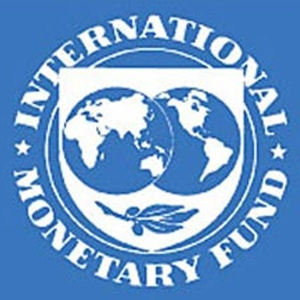 The World Bank combines the International Bank for Reconstruction and Development (IBRD—the name of the bank until 1975) with the International Development Association (IDA). It makes zero-to-low-interest long-term loans to low-to-middle-income countries for specific infrastructure and development projects. A combination of the International Finance Corporation (IFC), the Multilateral Investment Guarantee Agency (MIGA) and the International Centre for Settlement of Investment Disputes (ICSID) created the World Bank Group.
The World Bank combines the International Bank for Reconstruction and Development (IBRD—the name of the bank until 1975) with the International Development Association (IDA). It makes zero-to-low-interest long-term loans to low-to-middle-income countries for specific infrastructure and development projects. A combination of the International Finance Corporation (IFC), the Multilateral Investment Guarantee Agency (MIGA) and the International Centre for Settlement of Investment Disputes (ICSID) created the World Bank Group.
To become a member state of the World Bank, membership in the IMF and the IBRD are prerequisites. Like the IMF, the World Bank is a supranational. However, Article VII Section 3 of the IBRD (and World Bank) Articles of Agreement states:
Actions may be brought against the Bank only in a court of competent jurisdiction in the territories of a member in which the Bank has an office. [. . .] No actions shall, however, be brought by members or persons acting for or deriving claims from members. The property and assets of the Bank shall, wheresoever located and by whomsoever held, be immune from all forms of seizure, attachment or execution before the delivery of final judgment against the Bank.
There are 190 members states of the World Bank. None of their governments are allowed to have any claim on the World Bank. But while the World Bank is effectively a supranational otganisation, it is in theory vulnerable to private legal challenges, providing the claims are not made by any representative of a member state.
The IFC is the commercial arm of the World Bank Group that makes loans to private corporations. Its purpose is to create markets by “unlocking private investment” for private ventures that the IFC claims will contribute toward “ending extreme poverty and boosting shared prosperity.” The motive is financial gain.
In a 2019 case titled Jam vs International Finance Corporation (IFC), the US Supreme Court of the United States (SCOTUS) ruled that IFC could not be absolutely immune from prosecution if it engaged in commercial activity that was damaging to local communities. In theory, that meant the IFC could be sued. Initially, the ruling was hailed as proof that supranational organisations were not “above the law.”
The case concerned a claim made against the IFC by Budha Ismail Jam in 2015. He represented the people living in the communities of Gujurat, India, whose livelihood, health and environment were destroyed when the IFC financed the construction of a coal-fired power station owned by Tata Power. The Supreme Court decision meant that the case could proceed. But after it lost in the lower US federal courts, the subsequent appeal was rejected by the Supreme Court.
Bharat Patel, representing the plaintiffs, noted that the “IFC has never denied its role in the harms alleged in this case, and no court has ever held that IFC is not responsible for those harms.” Still, following the rejection of the appeal, an anonymous IFC spokesperson pointed out that the SCOTUS decision demonstrates that the IFC (World Bank Group) is immune from prosecution and that this would enable IFC to “continue to deliver on our mandate to improve economies, create jobs and alleviate poverty, especially in times of a global pandemic.”
The idea that the World Bank or its group is “not above the law” remains a purely theoretical legal concept. The supranational status of the World Bank remains intact. And, in terms of the practice of international relations, it retains the highest rank of power and authority.
Like the UN, the World Bank has private stakeholder “partners.” It describes itself as a “unique global partnership.” Its partners include, for example, the Global Vaccine Alliance (GAVI), created in 2000 by the Bill and Melinda Gates Foundation.
GAVI’s industry partners include the private pharmaceutical corporations GlaxoSmithKline, Jansen, Merck, Sanofi Pasteur and Pfizer. GAVI’s goal is to “shape new markets.” To that end, the World Bank can use its supreme power and authority to make sure that GAVI succeeds.
Some nations have created alternatives to the IMF and the World Bank. The so-called BRICS nations (Brazil, Russia, India, China and South Africa) established the New Development Bank (NDB) in 2015. Bangladesh and the United Arab Emirates joined the NDB in 2021, and Egypt and Uruguay have been provisionally accepted.
The NDB’s Articles of Agreement states that the NDB will “mobilize resources for infrastructure and sustainable development projects.” It is similarly committed to partnerships:
NDB places a strong emphasis on building and implementing effective partnerships, as promoted by SDG 17 on Partnerships for the Goals, to accelerate member countries’ endeavors dedicated to sustainable development. [. . .] NDB collaborates with a range of stakeholders in the global development community, including development agencies in member countries, international organizations, development finance institutions, commercial banks, enterprises, non-governmental organizations, universities and think tanks.
In addition the NDB commits to:
[G]uarantee, participate in, make loans or support through any other financial instrument, public or private projects, including public-private partnerships, in any borrowing member country[.]
NDB partners include The European Investment Bank (the lending arm of the European Union) and the World Bank Group. Among its private (commercial) partners are Santander Bank, based in Spain, and Standard Bank, headquartered in South Africa.
Another NDB partner is the Asian Infrastructure Investment Bank (AIIB). The AIIB offers its member nations an alternative to the Bretton Woods IMF and World Bank model.
In 2018, the UN granted the AIIB permanent observer status, allowing it to observe the deliberations of the UN General Assembly and its Economic and Social Council. AIIB President Jin Liqun said:
There is a natural alignment between AIIB’s mission to improve economic development in Asia and beyond and the UN’s development mandate. [. . .] We welcome this opportunity to deepen our relationship with the UN and enhance our contributions to the Sustainable Development Goals.
The AIIB currently has 105 member states, which are divided into regional and non-regional members. Regional members include Israel, Russia, China, India, New Zealand and Iran. Non-regional members, including the UK, Canada, France, Germany, Ireland, The Netherlands, Denmark, Brazil and Switzerland, are brought together under the AIIB Article Agreement.
The NDB and AIIB Articles of Agreement both declare that these two financial institutions possess supranational sovereignty. Like the IMF and World Bank, both are juridical persons. Article 30 of the NDB Agreement and Article 46 of the AIIB agreement deal with the respective bank’s status, privileges and immunities. The wording in them is practically identical.
The initial relevant paragraphs in both documents establishes the extent of their supranational sovereignty:
The Bank shall enjoy immunity from every form of legal process, except in cases arising out of or in connection with the exercise of its powers to borrow money, to guarantee obligations, or to buy and sell or underwrite the sale of securities, in which cases actions may be brought against the Bank in a court of competent jurisdiction in the territory of a country in which the Bank has its headquarters or offices, or has appointed an agent for the purpose of accepting service or notice of process, or has issued or guaranteed securities.
However, in both agreements this paragraph is qualified by the following:
Notwithstanding the provisions of paragraph (a) of this Article, no action shall be brought against the Bank by any member, or by any agency or instrumentality of a member, or by any entity or person directly or indirectly acting for or deriving claims from a member or from any agency or instrumentality of a member. Members shall have recourse to such special procedures for the settlement of controversies between the Bank and its members as may be prescribed in this Agreement, in the by-laws and regulations of the Bank, or in contracts entered into with the Bank.
There is no agreed-upon recourse to the member nation-state’s rule of law. Cases involving private prosecution of either the NDB’s or the AIIB’s own borrowing, debt guarantees or trade in securities may be brought. It remains to be seen if any such prosecutions will receive a fairer hearing than those brought against (and defeated by) the World Bank.
Otherwise, the powers of these supranational banks are inviolable. The documents’ initial statement that both banks “shall enjoy immunity from every form of legal process” effectively stands. Like the IMF and the World Bank, the NDB and the AIIB have supreme power or authority over their member nations’ governments and peoples.
The Sovereignty of Central Banks
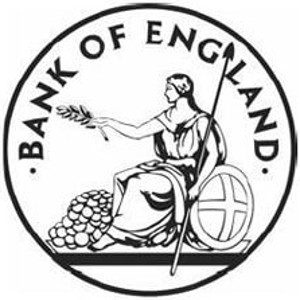 While global financial institutions have supranational sovereignty over their own member states, central banks hold sovereignty specifically over and above the government of their respective nation-states. They have the supreme power or authority to set crucial national policy and to issue currency. For example, central banks set interest rates and regulate other financial institutions independent of government oversight.
While global financial institutions have supranational sovereignty over their own member states, central banks hold sovereignty specifically over and above the government of their respective nation-states. They have the supreme power or authority to set crucial national policy and to issue currency. For example, central banks set interest rates and regulate other financial institutions independent of government oversight.
Supranational financial institutions such as the World Bank and the IMF operate within a global economy that relies upon the operations of central banks. The IMF, for example, allocates Special Drawing Rights (SDRs) as a form of reserve asset to be administered by national central banks.
SDRs are not currency but have a value calculated from a basket of currencies—the US dollar, the euro, the Chinese yuan, the Japanese yen and the British pound. Nations can use these SDRs to effectively finance IMF loans, repay debt obligations, serve interest repayments, trade on the markets or exchange for currency.
However, the currency underpinning SDRs’ value is a product of monetary policy. And monetary policy is the responsibility of central banks, without whom organisations like the IMF could not function.
The Bank of England (BoE) is the central bank of the UK. It is a private company incorporated in 1694, by virtue of its Royal Charter, and is registered at Companies House as RC000042. A Royal Charter has the following effect:
A Royal Charter is an instrument of incorporation, granted by The Queen, which confers independent legal personality on an organisation and defines its objectives, constitution and powers to govern its own affairs. [. . .] Organisations incorporated by Charter are registered at Companies House, who allocate an identification number with the prefix ‘RC’. This is to distinguish them from the other bodies registered at Companies House which are incorporated under the various Companies Acts.
The Royal Charter reads, in part, that the BoE:
[S]hall be, and be called one Body Politick and Corporate, of themselves, in Deed and in Name, by the Name of The Governor and Company of the Bank of England; and them by that Name, one Body Politick and Corporate, in Deed and in Name, We do, for Us, our Heirs, and Successors, make, create, erect, establish, and confirm for ever [. . .] they and their Successors shall have perpetual Succession, and shall and may have and use a Common Seal, for the Use, Business, or Affairs of the said Body Politick and Corporate.
The “Company of the Bank of England” is empowered by Royal Charter to carry out the business of “said Body Politick and Corporate” “for ever.”
Parliament makes the dubious claim that a Royal Charter “can be revoked by an Act of Parliament or by the Sovereign.” It then qualifies this statement by adding:
In practice, a chartered body is normally dissolved through voluntary action culminating in a Petition for Surrender. This is done by the body petitioning The Queen in Council [the Privy Council] to accept the surrender of its Charter. The Petition is accompanied by an appropriate Deed of Surrender together with the original Charter bearing the Great Seal (and any Supplemental Charters). [. . .] It follows from this that a chartered body cannot be dissolved by executive action.
The executive branch of government—the government—cannot revoke the charter of the BoE. In theory, revocation could be achieved by the legislative branch—parliament—but, as the Privy Council notes:
The Sovereign has no power to revoke a Charter at will, without the consent of the original grantees or their successors. In the absence of the consent of the grantee, it may be that the only way to revoke a Charter granted under the [Royal] prerogative would be by primary legislation [an Act of Parliament]. [. . .] The Privy Council Office is not aware of any Charter being revoked since the time of Charles II.
In 1670, Charles II revoked the Royal Charter of the Hudson Bay Company. This was only possible because the Hudson Bay Company submitted its Deed of Surrender, in which it requested that its Royal Charter be dissolved. Otherwise, Charles would have been powerless.
The idea that parliament could revoke the Royal Charter of the BoE presents a significant constitutional problem. Any act of the UK parliament has force in law only when it receives royal assent. This means that the head of state—the sovereign—must agree to the enactment of the legislation. Yet the sovereign has no power to revoke a Royal Charter “without the consent of the original grantees” (the BoE).
This is why the Privy Council suggest that revocation by parliament “may” be possible. It would be interesting to see what would happen if parliament ever tried. To date, it has never attempted to do so.
The official reported history of the BoE is that it was nationalised by the Bank of England Act 1946. The Act did not revoke the BoE’s Charter, so it remains a private incorporated company (corporation) to this day.
As a result of the 1946 Act, the BoE claims that it is “owned” by the UK government:
We were nationalised by the government in 1946 due to our importance to the economy. Other central banks across Europe passed from private to public ownership around this time too. [. . .] Most shareholders held relatively small amounts of Bank Stock. [. . .] They were all compensated by the government, receiving Treasury 3% stock in exchange for their Bank Stock. [. . .] We are wholly-owned by the UK government. The capital of the Bank is held by the Treasury Solicitor on behalf of HM Treasury.
Units of stock are called shares. The BoE states that nationalisation in 1946 saw its stock (shares) transferred to the UK Treasury. Its subsequent contention, that the BoE is therefore “owned” by the government, is not accurate.
In the 1948 case of Short v Treasury Commisioners, the ruling was that “shareholders are not, in the eye of the law, part owners of the undertaking.” This was later confirmed in the 2003 ruling of the Inland Revenue v Laird Group plc that shareholders do not own corporations. Thus, the British government does not “own” the Bank of England.
False claims about “ownership” are used to divert attention away from those who control the BoE. The Bank of England operates under, and is controlled by, the Court of Directors:
The Court of Directors manages the affairs of the Bank as a corporation. [. . .] They include determining the Bank’s objectives and strategy, and ensuring the effective discharge of the Bank’s functions and the most efficient use of its resources. [. . .] The members of Court are appointed by the Crown.
The UK parliamant defines what “appointed by the Crown” means:
Crown appointments are positions that may only be filled with the approval of the Monarch.
Other private corporations and interests are well represented by the BoE’s Court of Directors. The directors have variously held senior positions with Goldman Sachs, Grovepoint Capital, McKinsey & Co, Amadeus Capital, the British Private Equity and Venture Capital Association, TalkTalk Telecom Group, Sainsbury’s, Worldpay, Natwest, Permira, Reed Elsevier Ventures, the Trades Union Congress, Drax Group, Shell, Bechtel and Powergen.
The directors have no duty to disclose any information. In fact, by virtue of agreeing to take up their positions, they give their oath to:
[K]eep secret during my service with the Bank of England, and after the termination thereof, all matters with which I may become acquainted relating to the affairs and concerns of the Bank[.]
A nation’s monetary policy is the mechanism by which it controls the availability of money to banks, consumers and businesses. It is the power to issue money and effectively control the entire economy. The Monetary Policy Committee (MPC) of the BoE exercises this sovereign power in the UK. It is the UK’s monetary authority.
Irrespective of government inflation targets, the BoE sets the interest rate. It also regulates all UK banks and financial institutions. The BoE acts as the clearinghouse for all UK-based commercial banks, all of which have to maintain their bank reserves with the BoE. The central bank also monitors financial activity, stores gold reserves and process all electronic payments.
The BoE website states:
[W]e carry out our responsibilities independently. We’re free from day-to-day political influence.
The Bank of England has immunity in its capacity as a monetary authority [. . .] “immunity” means immunity from liability in damages in respect of action or inaction[.]
In legal terms, “immunity” means:
An exemption from serving in an office, or performing duties which the law generally requires other citizens to perform.
As a monetary authority, the BoE exercises immense influence and control over the UK economy. It is immune from prosecution for its monetary decisions. It conducts its business in secret and chooses what to disclose. It is independent of the government and enjoys free rein to steer the economy in any direction it wishes.
The Bank of England is a private corporation controlled by people with extensive links to other private corporations. They are appointed to operate the business of the BoE by the Crown. The BoE is not owned by the British government, and certainly not by the people. Its nationalisation did nothing to change its status in law as a juridical person. The Bank of England is sovereign.
The way in which central banks achieve sovereign status as the monetary authority in their respective nations varies from country to country. But they all have been given the mandate to shape national economies, and nearly all act with supreme power or authority.
As for America’s central bank, the United States Federal Reserve Bank (the Fed) is a system of 12 district federal reserve banks. Like the BoE, the Fed is not “owned” by the government. Unlike the BoE, though, it is more open about this fact:
The Federal Reserve System is not “owned” by anyone[.] [. . .] [T]hough the Congress sets the goals for monetary policy, decisions of the Board [. . .] do not require approval by the President or anyone else in the executive or legislative branches of government[.] [. . .] [T]he Reserve Banks are organized similarly to private corporations. Each of the 12 Reserve Banks [. . .] is separately incorporated and has its own board of directors.
In 2007, then Fed Chairman Alan Greenspan was asked by TV journalist Jim Lehrer what the proper relationship between a US President and the Fed should be. To which Greenspan replied:
[T]he Federal Reserve is an independent agency, and that means, basically, that there is no other agency of government which can overrule actions that we take. So long as that is in place, [. . .] then what the relationships are don’t, frankly, matter.
The Bank of Russia (Russian central bank) is similarly independent of the Russian Federation. It operates as a corporation and is a juridical person:
[T]he Bank of Russia is a special public legal institution that has the exclusive right to issue currency and organise its circulation. The Bank of Russia is not a body of state power, but its powers are, in effect, the functions of a body of state power[.] [T]he Bank of Russia performs the functions and exercises the powers stipulated by the Constitution of the Russian Federation [. . .] independently from the federal bodies of state power[.] The legislative powers of the Bank of Russia imply its exclusive right to issue regulations binding on federal bodies of state power, regional authorities, local governments and all legal entities and individuals on matters placed under its remit[.] The Bank of Russia is a legal entity [juridical person – corporation]. [. . .] [T]he Bank of Russia has both proprietary and financial independence. It exercises its powers to own, use and manage its property, including its international reserves[.]
Central banks the world over create policy, issue currency, control financial and business activity, regulate financial markets and financial activity (including investments) and effectively run national economies. Almost all are independent private corporations which possess supreme power and authority in their host countries.
Just as commercial banks must bank with their relative national central bank, so many of the world’s leading central banks hold accounts with their global central bank of central banks: the Bank for International Settlements.
Supreme Global Sovereignty
The 1944 Bretton Woods conference also established the US dollar as the world’s global reserve currency. This is the currency used by national central banks to pay international debt obligations.
Other countries, such as Russia, needed to retain “reserves” of US dollars in order to “settle” cross border payments with other nation-states. This settlement of reserves, denominated in dollars, was—and still is—conducted by central banks through the Bank for International Settlements (BIS).
Following WWI, the 1919 Treaty of Versailles imposed reparations upon Germany. The German economy was unable to sustain the payments, so the Dawes Plan and then the Young Plan structured central bank loans from the Allies to support the German economy so that it could pay the reparations. The 1929 Young Plan included a recommendation to form a specialised international bank (the BIS) to administer the reparation payments.
The 1930 Hague Convention established the Bank for International Settlements. Article 1 declares:
Switzerland undertakes to grant to the Bank for International Settlements, without delay, the following Constituent Charter having force of law: not to abrogate this Charter, not to amend or add to it, and not to sanction amendments to the Statutes of the Bank[.]
Article 10 of the Constituent Charter adds:
The Bank, its property and assets and all deposits and other funds entrusted to it shall be immune in time of peace and in time of war from any measure such as expropriation, requisition, seizure, confiscation, prohibition or restriction of gold or currency export or import, and any other similar measures.
The BIS was created by international treaty as the world’s first international financial institution. It had—and still has—supranational sovereignty. The BIS, its directors and employees were—and still are—immune from any form of government or intergovernmental regulation, scrutiny, accountability or taxation.
In the post-WWII period, despite having acted as a transaction and deposit bank for the German Nazi regime, the BIS has expanded its operations. It is now the bank for all of the world’s major central banks.
The BIS is a profit-making enterprise that trades gold coin or bullion, holds gold reserves for central banks, makes loans to or borrows from central banks, speculates in foreign currency exchanges, trades in negotiable securities other than shares and maintains current or deposit accounts with central banks.
The BIS has 63 member central banks. These include the central banks of the US, Canada, the UK, France, Germany, Italy, Japan, Saudi Arabia, Brazil, Russia, India, China, South Africa and the European Central Bank (ECB). Collectively they account for 95% of the world’s GDP.
The BIS states:
Our mission is to support central banks’ pursuit of monetary and financial stability through international cooperation, and to act as a bank for central banks.
Article 1 spells out that the BIS is a private corporation:
There is constituted under the name of the Bank for International Settlements (hereinafter referred to as the Bank) a Company limited by shares.
Every member central bank agrees to abide by the Statutes of the Bank for International Settlements. Article 17 of the statutes declares “ownership of shares of the Bank implies acceptance of the Statutes of the Bank.”
Rather like the BoE, the BIS claims in its promotional literature that when a central bank holds shares of BIS stock, this equates to so-called shared “ownership” of the BIS. However, that is not what its statutes say. As with the BoE, this alleged ownership doesn’t necessarily amount to any real authority within the BIS.
Article 14 states:
The ownership of shares of the Bank carries no right of voting or representation at the General Meeting. The right of representation and of voting, in proportion to the number of shares subscribed in each country, may be exercised by the central bank of that country or by its nominee.
The business of the BIS is administered by its board of directors. Article 26 reads, “The administration of the Bank shall be vested in the Board.”
The current BIS board is comprised of 15 directors plus the chair and the vice chair. The directors are all central bankers. They include Christine Lagarde, the former head of the IMF and the current head of the European Central Bank.
In any reasonable sense, Lagarde is a convicted financial criminal. However, as already covered, national law and international law do not adhere to the principle of lex iniusta non est lex. Some people and organisations are above the law—and Lagarde and her fellow BIS directors are among them. Despite being found guilty of criminal financial negligence, Lagarde’s stature made her immune to sentencing in the eyes of the court. Such is the “rule of law.”
Governments do not have sovereignty either over their own central banks or over the BIS. To accentuate this point, Article 30 of the BIS statutes specifically excludes governments from influencing its decisions:
No person shall be appointed or hold office as a Director who is a member or an official of a Government unless he is the Governor of a central bank and no person shall be so appointed or hold office who is a member of a legislative body unless he is the Governor or a former Governor of a central bank.
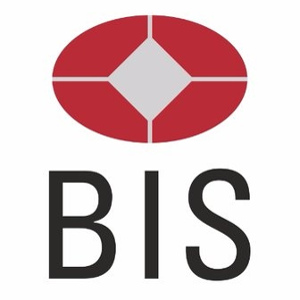 Immunity from jurisdiction is an important function of international relations between nation-states. It enables foreign embassies to effectively act as protected islands of national sovereignty within other nation-states. International development banks such as the World Bank, AIIB and NDB also enjoy immunity from jurisdiction, enabling them to essentially operate in foreign territory without incurring any legal risk.
Immunity from jurisdiction is an important function of international relations between nation-states. It enables foreign embassies to effectively act as protected islands of national sovereignty within other nation-states. International development banks such as the World Bank, AIIB and NDB also enjoy immunity from jurisdiction, enabling them to essentially operate in foreign territory without incurring any legal risk.
The BIS has a legal status agreement with the Swiss government. Article 1 states that the Swiss government recognises “the international legal personality and the legal capacity within Switzerland of the Bank for International Settlements.”
The BIS and its buildings, surrounding land, documents, electronic records and commercial activities are all inviolable. The BIS can operate its own police force, is tax-exempt, and can freely move currency and other assets, such as gold, in and out of Switzerland without any oversight, scrutiny or investigation.
Article 55 (1) states that the BIS is immune from any and all jurisdiction: “The Bank shall enjoy immunity from jurisdiction.”
The legal definition of “jurisdiction” is:
The power and authority constitutionally conferred upon (or constitutionally recognized as existing in) a court or judge to pronounce the sentence of the law, or to award the remedies provided by law [. . .] in some manner sanctioned by law as proper and sufficient.
Truly, the BIS is exempt from all law. There are no governments and consequently no intergovernmental organisations that have any power or authority over the BIS. It is the “highest rank of power and authority” on Earth: the “supreme power or authority.”
Take a moment to fathom it: The Bank for International Settlements, a private corporation, is sovereign over the entire planet.
Georgetown University history professor Carroll Quigley was given exclusive access to the private writings and opinions of the transnational community of powerful globalists who exploit government sovereignty for their own agendas. In his immense work, Tragedy and Hope: A History of the World In Our Time, published in 1966, Quigley explained the purpose of this global network of private interests that dominate every nation on Earth:
[T]he powers of financial capitalism had another far-reaching aim, nothing less than to create a world system of financial control in private hands able to dominate the political system of each country and the economy of the world as a whole. This system was to be controlled in a feudalist fashion by the central banks of the world acting in concert, by secret agreements arrived at in frequent private meetings and conferences. The apex of the system was to be the Bank for International Settlements in Basle, Switzerland, a private bank owned and controlled by the world’s central banks which were themselves private corporations. Each central bank [. . .] sought to dominate its government by its ability to control Treasury loans, to manipulate foreign exchanges, to influence the level of economic activity in the country, and to influence cooperative politicians by subsequent economic rewards in the business world.
Through an interwoven, compartmentalised stakeholder network of sovereign organisations and sovereign partnerships, those who wield sovereign power have created a Global Public-Private Partnership (G3P). By studying the G3P’s moves, we can analyse this system and discern the forces at play.
So, it is within the above context that the conflict in Ukraine can be understood. Russia’s special military operation is, in a nutshell, one move by one nation in a global struggle for position inside the G3P.
The BIS and the central banks are not threatened by confrontations between governments (as we shall see). Why would they be? They and their predecessor organisations have been deriving immense profits from every major conflict since 1694.
Cui bono? To whom is Russia’s military operation in Ukraine a benefit?
This is the question we will seek to answer in Part 6.

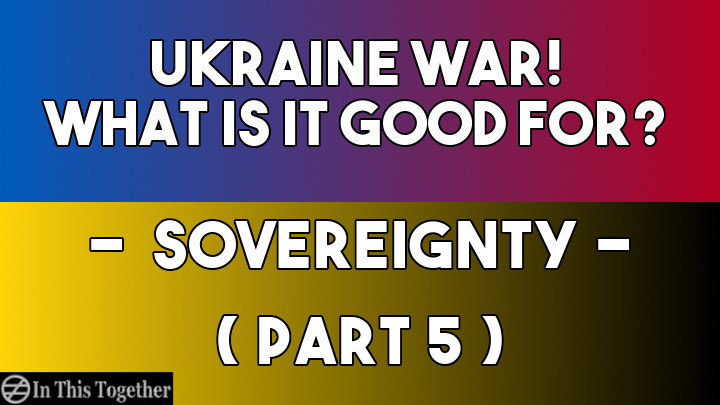
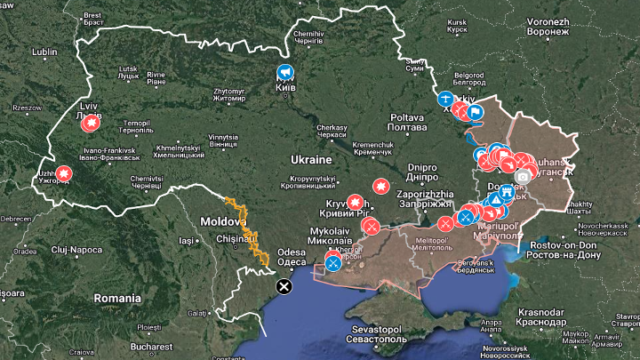

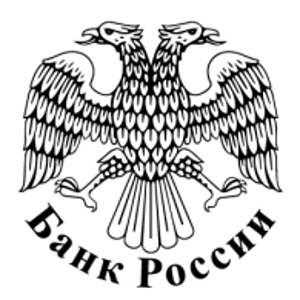
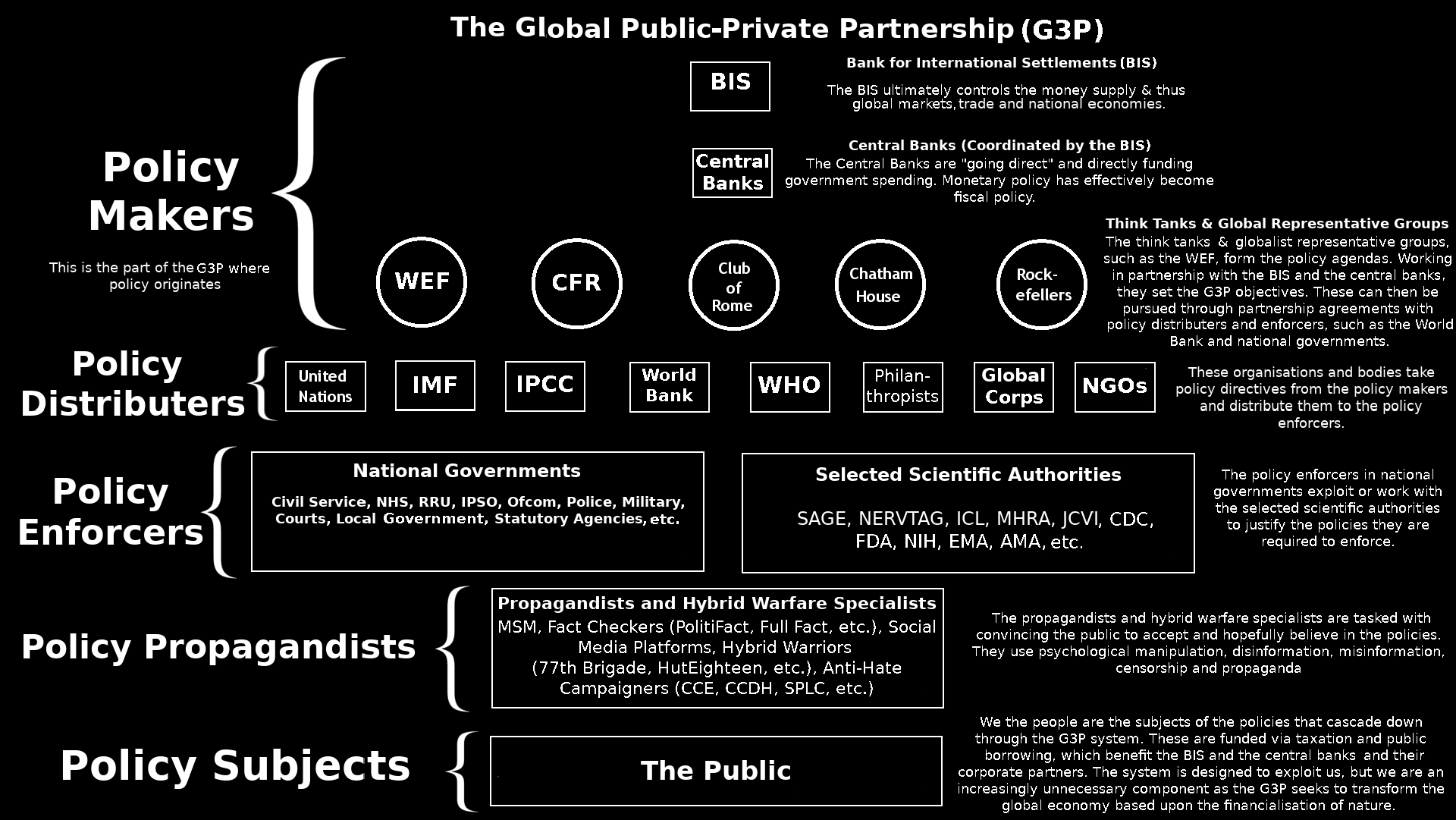
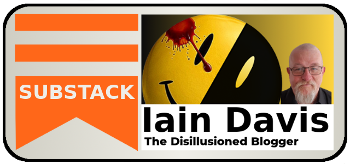

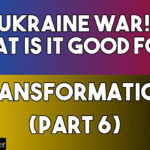
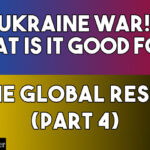
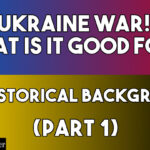
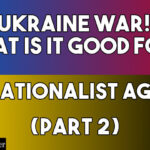
Great article Iain, pretty soon the Emperor will have no clothes 🙂
Thanks Freecus. The Emperor hase been prancing around in the nuddy for some time. 🙂
ID: War is an obscenity and a crime for which all of humanity is guilty.
BP: Those who instigate war are guilty of crimes against humanity.
ID: We allow governments to rule us and to make decisions on our behalf.
BP: In the US, we the people are the government. The government and the citizens are one and the same. The citizens “can” vote to replace elected representatives in periodic elections. Unfortunately, our 2020 election exposed how elections can be corrupted by fraudulent electronic voting machines and the nefarious practices of “mail-in voting” (which is not the same as “absentee voting”) and “ballot harvesting.” Also during the 2020 election, we watched how the corrupt media (newspaper, television, internet) can suppress news stories to promote their favored political candidate and fabricate news stories to indict the candidate they disfavor.
ID: Governments often start wars or create the conditions for war.
BP: Actually, the Rothschilds and their underlings (banksters, Rockefellers) are responsible for instigating just about every national revolution and international war from the French Revolution to WWI to the Russian Revolution to WWII, Korean War, Vietnam War, Gulf War, etc. Putin is solely responsible for instigating the war with Ukraine. There was no justification for his invasion! Putin is the Russian government. The Russian people are not the Russian government. Russia is governed by a “Thugocracy!” Prior to the Rothschilds, it was the Venetian oligarchy who instigated the Hundred Years’ War, the Thirty Years’ War, England’s “Glorious Revolution.”
https://concisepolitics.com/2015/07/25/rothschild-empire-a-long-history-of-many-scams/
https://concisepolitics.com/2018/09/23/revenge-of-the-rothschilds-crime-mafia-against-russia-and-america/
http://lust-for-life.org/Lust-For-Life/AgainstOligarchy/AgainstOligarchy.pdf
ID: There are better democratic systems of governance, but we neither advocate nor pursue them. Thus, all adults are equally responsible for allowing the travesty of war to continue.
BP: Still proselytizing for Lysander Spooner’s anti-government “Anarchism.”
I’ll repeat, the Rothschilds and individual tyrants are responsible for instigating wars.
The citizens and people are the victims of the tyrants’ wars.
ID: In short, regardless of the despicable nature of war, Russia had legitimate reasons to intervene. In fact, globalist think tanks in the West not only predicted that Russia would eventually have to strike at Ukraine, they extensively prepared and planned for the eventuality.
BP: Putin (not Russia) had no legitimate reasons to intervene in the political machinations occurring within the borders of Ukraine, and the Donbas region lies within Ukraine. Putin did not invade Estonia, Latvia, Lithuania, Poland, Turkey, (and soon Sweden and Finland) when they joined NATO.
Look forward to Part 6 and your explanation of who benefits from the Russian invasion of Ukraine. Obviously not the people of Ukraine and Russia who are the victims of Putin’s crimes against humanity.
Thanks William for another thought provoking comment. I look forward to your comments on future posts in the series. Who knows, you may be surprised?
Iain, this is an excellent analysis of the our collective dilemma – Power and Money and selfish interests. Your clear perspective on these matters at least gives us some context, insight and understanding of the ‘game’ that is being played out globally. And through this an opportunity perhaps to find ways to influence/subvert/redirect it creatively.
I hope so James.
Useful explanation of high finance but increasing ‘creep’ of totalitarianism into non-MSM loses buy-in.
1 Understanding another’s reasons defuses conflict without necessarily agreeing and, is what conversation is.
Other may or may not then decide to desist, either way, both increase knowledge and often see third way each prefers to own first idea.
Not understanding other’s point of view is easily manipulated by third parties.
2 Blame off-loads personal responsibility, learns nothing, resolves nothing.
Not all over 18s are ‘adult’, not all under 18s childish; minority have small chance of turning crowd 180; not trying guarantees failure.
Phrases like ‘all adults’, ‘the masses’, ‘the public’ are totalitarian, derogatory and, by not acknowledging individuals, fail to counter WEFetal.
Generalisations, being inaccurate, provocatively accuse innocents.
Doing same as ‘governments’ fails to illustrate alternative in contrast to WEFetal.
Blaming all others for ‘war’ is WEFetal’s eugenicists’ line; ‘war’ human-world’s ill.
3 Each individual is above price, none more nor less. Thus, ‘ladder’ is fiction.
Yet ‘class’ this, ‘class’ that, ‘elite’ increasingly in non-MSM; demeans self, strokes WEFetal’s ego, aids its agenda, spreads incorrect mantra and, by inciting hatred and division, diverts and diminishes resistance.
4 Ukraine repeats scripted virus theatricals; squabbling with each other instead of with virus to further and cover WEFetal’s destructiveness.
Their aim is global, not merely national or regional.
Unconvinced they’ve broken ranks; too early, they’ve not yet got it all.
As can’t lose unless squabble; losers’ game, each pushes other down, neither rise.
Squabbling traps in crowd. None benefit. All lose.
Whereas, ‘live and let live’ raises own game; each reaches own maximum potential.
Refraining from squabbling stays free.
Not safe unless free.
5 Sovereignty is over oneself. Thus, over none other.
‘My’ partner, ‘my’ children, ‘my’ team, ‘my’ staff, ‘our’ students; possess persons.
‘The’ other half, ‘the’ children, ‘the’ team, ‘the’ staff, ‘the’ students; rarely said now.
‘Sovereignty’, ‘power’, ‘authority’ over others only ever desired by the weak.
Unless oneself governs oneself according to natural law, are greedy, over-bearing, easily out-witted.
6 WEFetal described in terms of individuals’ names, instead of only entities, aids understanding their agenda; thence, increased resistance to it.
Agreed. I hope you will like the rest of the series.
Your description of the atrocities committed by the Nazis upon the people within Ukraine can be similarly compared to the atrocities committed by the Democrat Party in the US upon the people living in the Democrat Party controlled cities within the US. The policies of the Democrat Party have caused the high mass murder rates within the cities, and also the collapse of civilized life within the cities. With all of the murders and violence taking place in Democrat Party controlled cities close to the Canadian border, and Justin Trudeau knowing that the US could be a threat with our arsenal of nuclear weapons, why hasn’t Justin Trudeau invaded the US to eradicate the Democrat Party just like Putin invaded Ukraine to eradicate the Nazi/Maidan Party?
I was especially interested in the Bank of England section concerning nationalisation. So it is nationalised but not in the way that is generally understood; it is and it isn’t! It’s as bent as a nine bob note but it’s straight in the terms with which it describes itself! I’m constantly repeating that biblical phrase-“the truth is not in them” regarding almost everything to do with money and the law. These people don’t lie and they never tell the truth. And they are immune to prosecution in the rules based system of law. It’s all got to be stripped away. With reference to the Emperor’s clothes- as far as money is concerned- they are real, it’s the Emperor who doesn’t exist.
Thanks NixonScraypes
I suspect that our Western PTB and assorted oligarchs might feel that they have Putin and his Russian cohorts by the nuts because they didn’t react viciously when the money was seized by the Western gangs pretending to be governments. The Russians really should have thrown EVERYTHING at the BIS manipulators immediately. They have missed the opportunity … and our power-crazed loons give one the impression that they feel they are in the ‘ascendancy’ … perish the thought.
Thanks hotrod31. I am not convinced that Russia wanted to do so. The evidence I will explore in Part 6 will expands on this point.
“Sovereignty” has nothing to do with the war. This is a war of break-up of pseudo-socialist, Stalinist state. Instead of quoting Machiavelli, should have been quoting Milovan Djilas. IMHO…)
I agree. Sovereignty has little to do with the war beyond the the fact that the DPR and LPR would like to exercise some. The point of this article is to highlight how sovereignty operates globally. Especially in the context of central banking and international financial institutions. Which I suggest is relevant to the reasons behind this conflict.